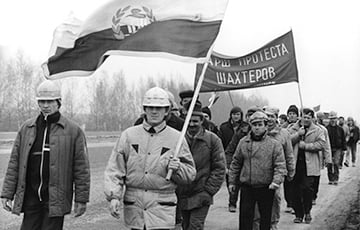"The Miners Are Coming! Well Done!"
4- 1.02.2021, 13:06
- 17,757

How the miners marched to Minsk.
Almost 29 years ago, the first trip of the Salihorsk miners to Minsk took place. By analogy with their brothers in the trade union movement from Ukraine and Russia, on April 10, 1992, Belarusian miners set off in a column to the capital of Belarus to convey their demands to the government of the country, reports the Belarusian Independent Trade Union.
After unsuccessful negotiations for more than two months of the Independent Trade Union of Miners of Belarus on the conclusion of the Tariff Agreement, on March 12, 1992, workers of the Belaruskali production association announced the beginning of an indefinite strike.
On March 16, railways were blocked in order to prevent the shipment of the company's finished products. However, these actions did not have a quick effect.
On March 30, at the suggestion of I.V. Yurhevich, a hunger strike was announced at 4 Mining Administration, and then the hunger strike was transferred to the Belaruskali production association. Eight miners and their family members were on a hunger strike in the PA Belaruskali building. And even this desperate step did not push the matter forward.
At the 12 thousandth rally in Salihorsk, a decision is made: since Minsk does not hear us, we will bring our demands directly to the Government House.
On April 10, a column of miners with the Independent Trade Union of Miners' banner and the White-red-white national flag of Belarus, with the inscriptions on their helmets "Salihorsk - Mensk," left Salihorsk.
From the memoirs of a participant in the campaign Siarhei Starasotski:
"About 40 km - this is the result of the first day. Two people did not reach Slutsk. Local authorities were thoroughly reinsured. It was forbidden to spend the night at the school, although earlier there was an agreement about this. Even the city Council deputy Mikhail Tahil's id did not have the desired effect. We had to move on. We stopped for the night in a club in the village of Haradzishcha. Early in the morning, we set off again.
Passing the settlements, meeting and talking with local residents, we were amazed: even in Sluchchyna, people had no idea about the real situation in Salihorsk. Many were indignant: "Where are you going and why? You get 30 thousand rubles each!" And only the "kvitki," which we prudently took with them, convinced that the miners' real salary was 1.5 thousand rubles (or 60-80 dollars at that time).
The second day was the most grueling. We walked 60 km to the village of Karaleva. No more than 20 people were in the ranks 20 km before the night shelter. The rest, with sprained tendons and bloody calluses, were driven by volunteer drivers who followed us.
Most amazingly, no one wanted to leave the route. People with sore feet had to be forced into cars. The rest walked; at the halt, they simply fell. It was even more difficult to get up in order to continue the journey.
Of course, we tried to observe the order of travel and the distance to not interfere with transport. Welcome signals from oncoming and overtaking drivers encouraged us. Some stopped and shared food with us because we only had "lunch boxes we took from home. The villagers treated us to milk and food.
On the way to Minsk, we had Karaleva and Sennitsa. Tired after the exhausting travel, we were in Minsk's outskirts by the end of the third day and spent the night in the gym in the village of Sennitsa. I will never forget the attitude of the people of those settlements where we passed: "The miners are coming! Well done! If not you, then who?"
On the morning of April 14, in Minsk, the march participants were already awaited by those on the hunger strike led by Ivan Yurhevich, in a tent, on Independence Square. Most of Belaruskali workers arrived by trains and commuter trains. On the same day, the chairman of the NPGB, Ivan Yurhevich, was given the opportunity to address the deputies of the Supreme Soviet of Belarus.
The miners sent their activists to all the large factories in Minsk so that the Minsk workers would provide support. And Minsk residents came to Independence Square. In front of the building of the Supreme Soviet, a 50,000-strong rally was organized, at which a number of demands were put forward, which were supported by representatives of the fraternal trade unions and political parties of Belarus.
As a result of a whole series of protests: strikes, hunger strikes, a campaign, and a whole series of negotiations, the workers of Salihorsk achieved their goal.
As a result, a Temporary Agreement was signed, based on which the salary was increased by 3.4 times. A collective agreement has been concluded between the employer and the NPG that included payment of dividends, payment for travel time to workplaces, night shifts, recreation, increased vacations, the creation of personalized pension insurance and other benefits.
All this is used today by the young generation of employees of the JSC Belaruskali, which must remember that nothing comes easy in this life and you have to fight for everything.










